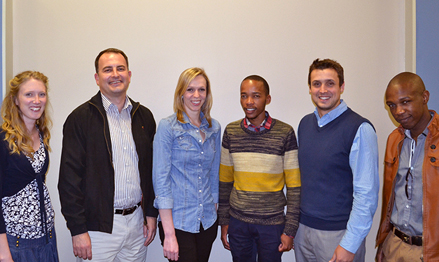Latest News Archive
Please select Category, Year, and then Month to display items
23 April 2020
|
Story Cornelius Hagenmeier
|
Photo Pixabay

The iKudu project, which is an European Union-funded Capacity Building in Higher Education (CBHE) project, has recently launched its blog, which aims to amplify the diverse voices of all iKudu stakeholders. In this space, members of the iKudu team will regularly share their views on the project and related international education topics.
The iKudu project focuses on developing a contextualised South African concept of Internationalisation of the Curriculum (IoC), which integrates Cooperative Online International Learning (COIL) virtual exchanges. The project was launched by the UFS in 2019, together with nine European and South African partner universities. It is funded by the European Union’s Erasmus+ programme with EUR999 881 (approximately R20 million) and is implemented over a three-year period.
The iKudu project is based on the fundamental belief that it is necessary to rethink internationalisation in an uncertain world. First, it is crucial to recognise and transform the power dynamics underlying international academic collaboration. Second, it is essential to develop pedagogies that allow every student to participate in international education, integrating technology where appropriate.
However, while all stakeholders agree on the fundamental tenets of the project and its principal goals, all iKudu stakeholders contribute different perspectives. In the blog, the iKudu stakeholders will provide a space for intellectual discourse on the project and related international education topics, which will allow constructive and critical engagement.
The link to the blog can be found at: https://www.ufs.ac.za/ikudu/ikudu-blogs/Transforming-Curricula-through-Internationalisation-and-Virtual-Exchanges
UFS gets support for improving university access and success in South Africa
2013-10-24
|
 |
|
Members of the SASSE Research team are from left: Carike Jordaan, Dr Francois Strydom, Lana Swart, Seisho Gaboutlwelweboutlwelwakemo, Michael Henn en Katleho Nyaile.
Photo: Supplied
24 October 2013 |
The university’s Centre of Teaching and Learning (CTL) received a grant for US$820 000 (about R8 million) from the Kresge Foundation for their South African Survey of Student Engagement (SASSE) research team.
The SASSE research team is committed to furthering student access with success by promoting quality teaching and learning institutionally and promoting collective impact around student success nationally.
Through this three-year project, the SASSE team aims to provide a range of deeply contextualised and globally benchmarked student engagement measures that can be used at institutional and module/course level for the South African context. The data from these measures can be used to improve the quality of undergraduate teaching and learning, and participating institutions will have access to appropriate capacity development interventions to empower them to use the data to promote evidence-based change in their institutions.
Dr Francois Strydom, Academic Director at the CTL, says the lessons from this higher-education project could be used to develop a stronger post-school sector which could help the country to deal with the massive challenge of youth unemployment; thereby promoting equity, social justice and a prosperous democracy in South Africa.
The Kresge Foundation is a private philanthropic foundation in the United States, which is focused on creating opportunity for low-income people through various programmes. This three-year project forms part of the Kresge Foundation’s Education Programme, which focuses on promoting access and success at South African universities. Therefore the SASSE project aims to contribute to the Kresge-sponsored Access and Success in Higher Education in South Africa (ASHESA), to promote a national conversation on improving student success.
In January this year, the university was one of four South African universities selected to take part in a multi-million rand programme to bolster private fund-raising and advancement efforts. For this programme the UFS was granted US$640 000 (about R5,6 million) over a period of five years.